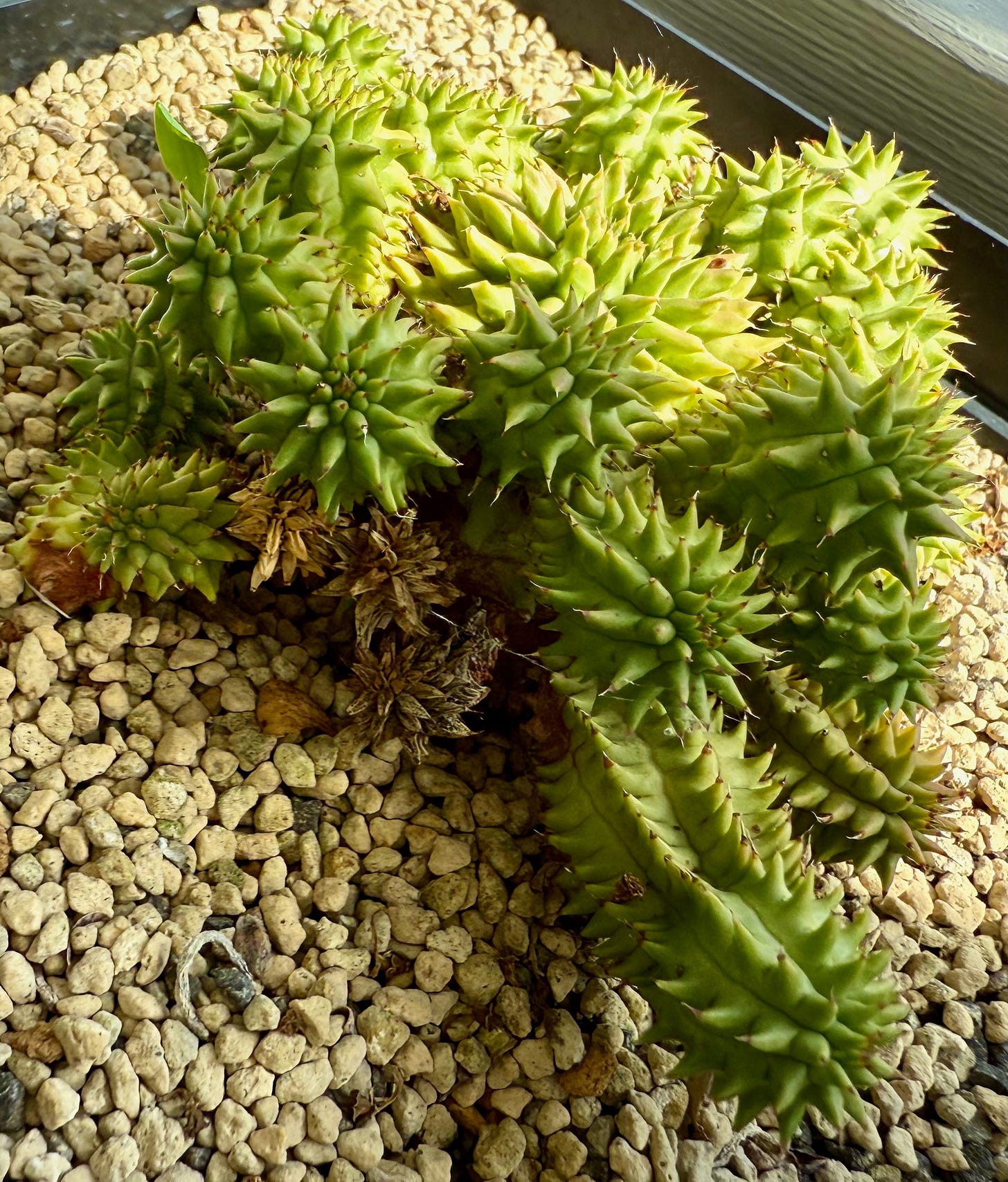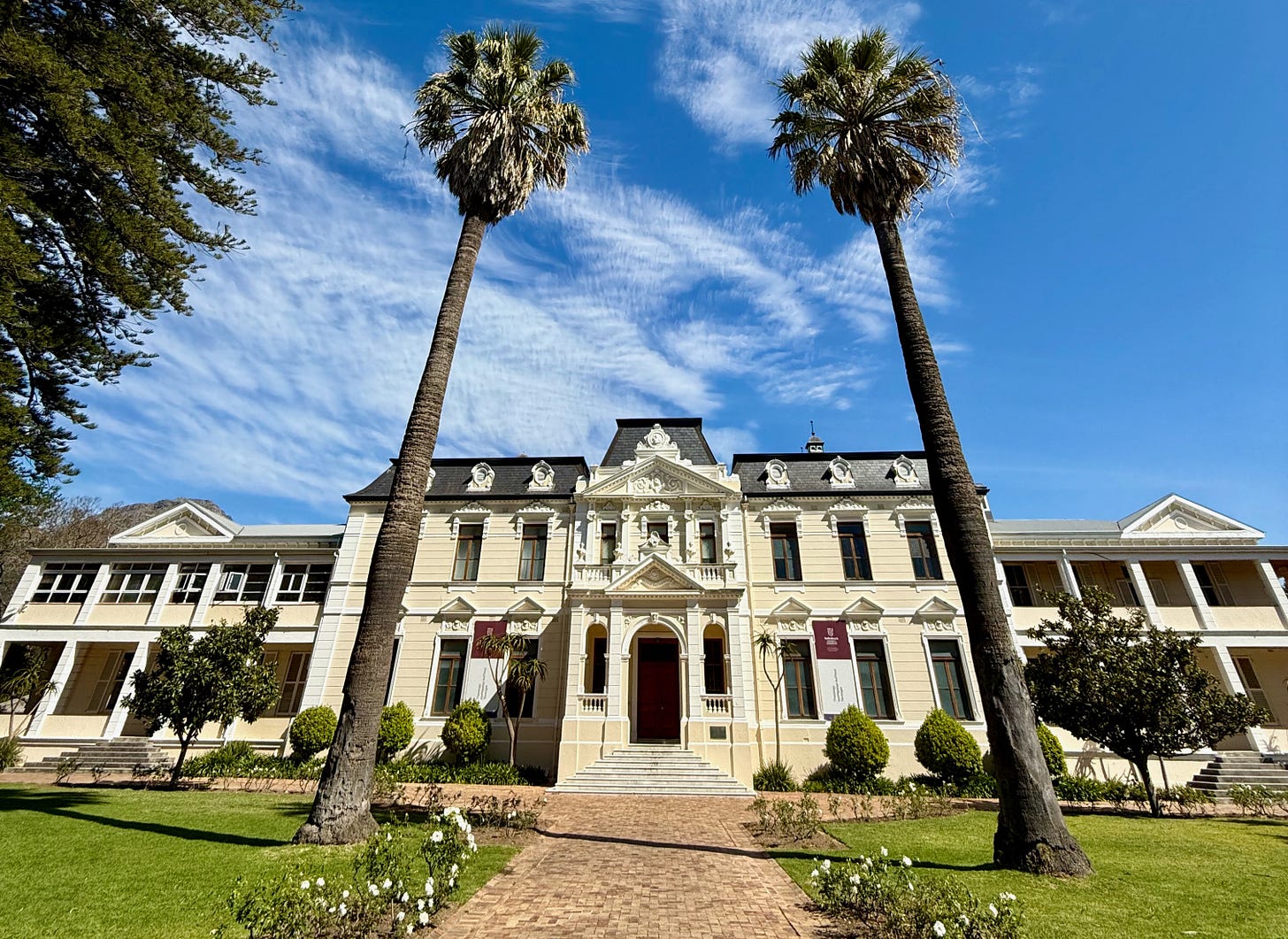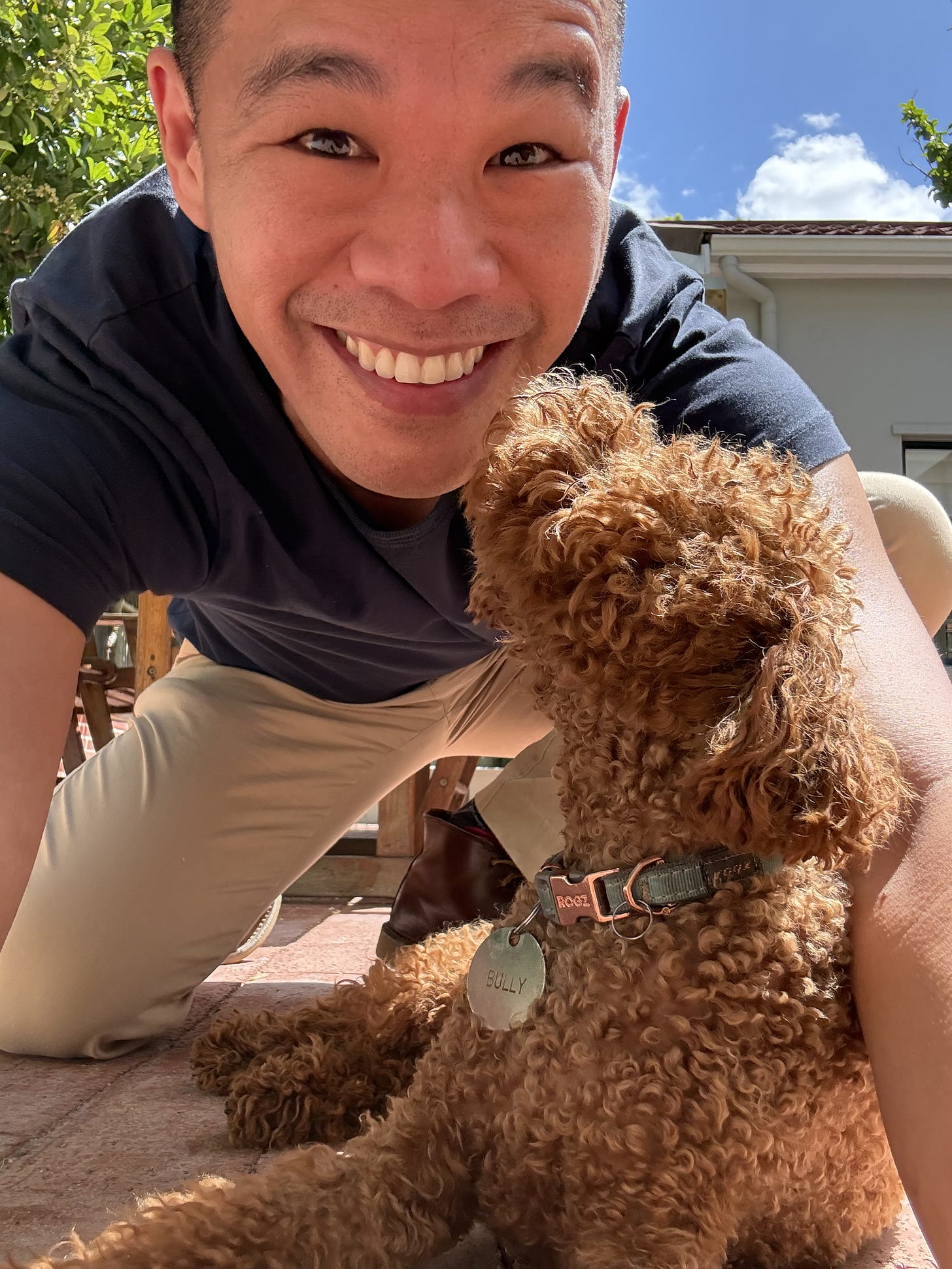Only the Living
Some fragmented thoughts on academic life, theological conversation, the things that matter, Lebanon under attack, rare plants, and a Good Soil giveaway
Friday, October 25
Stellenbosch, South Africa
For the past few days, I’ve been in South Africa, wearing my PhD-student hat. At home, I sometimes forget that I’m also a student. There’s no formal deadline to my PhD work. It’s up to me to do what needs to be done to finish. One may graduate in as little as three years; four is typical; dither for six or seven, and they’ll start to wonder if you’re actually serious.

Beneath my obvious to-do list—reading, thinking, writing—the core thing I’m grappling with is some variation of a common question: What am I even doing? I don’t mean that in a throw-up-the-hands sort of way, though that would be understandable, given the state of the world. I suspect that most of us want our work—indeed, our lives—to matter for more than mere self-satisfaction.
To be in South Africa among others who are doing theology has been invigorating in many ways. It reminds me of the importance of community—and even this shy introvert appreciates the gentle rebuke of my isolationist tendencies. Still, I wonder: What do our debates and arguments amount to? What is our theology worth?
I don’t mean only dissertation-length or book-sized theologizing but also the shorter forms: these newsletters, sermons, even social-media posts. Whether explicitly or implicitly, all these things express our theologies. They embody our longings. They capture our attempts to make meaning. They convey our flailings, as we search for connections between the human and the divine. They make claims about justice and say something about how we view and live out love (or the lack thereof).
This is where things feel especially dangerous—or maybe it’s merely uncomfortable. “Of making many books there is no end,” Qohelet said. (Caveat scriptor.) “Much study is wearisome to the flesh.” What if he meant that the study would be exhausting if it were merely academic, if the words never leapt off the page and became embodied in action? I’ve been reading so many words about peace, reconciliation, healing—all feel so beyond possibility at the moment. Faith, hope, love—Paul insisted that these three things remain, but where and how and toward what end?
In other words, what exactly am I doing? What exactly are we doing?
--
In her book To Cast Fire upon the Earth, the Nigerian theologian Teresa Okure writes about a person who was forced to jump out of a plane, parachuted to the ground, and ended up stuck in a tree. He didn’t know where he was. Fortunately, a man came wandering by.
“Sir, could you tell me where I am?” the accidental parachutist said.
“Yes, of course,” the passerby said. “You are hanging on a tree.”
According to Okure, the man in the tree then said: “Sir, you must be a theologian.” Delighted to be seen and known, the passerby confirmed that fact and then asked: “How did you know?”
“Because,” the man answered, “what you say is true but absolutely irrelevant.”
Okure uses this story to argue that any worthwhile theology—which is to say, our attempts to understand what God might be doing as well as our place in that work—must be grounded in and engaged with the lived experience of the world. (By the way, I don’t even think you have to believe in God with a capital G to do theology; we all have our gods.) To her, serious theology concerns itself intimately with matters of everyday life and actual death. In chorus with several other African women theologians I’ve been reading here, Okure has little time or patience for ideas and proposals that spring into existence inside the ivory tower but never seem to find the door out to the rest of the world. There is, she writes, a “difference between a theology that grows from life and that which grows from book and theory.”
Her argument resonates with something that my adviser, Robert Vosloo, said when we first discussed the possibility of me studying at Stellenbosch. He’s a systematic theologian. I told him I was not—and that, really, I should be talking to someone in the practical-theology department. He demurred. “Things are different in South Africa,” he said. “Here, we do not have the luxury of doing theology that doesn’t actually affect people’s lives.” In other words, all theology must be practical theology—the sort that helps a stuck man get out of a tree and find his way.
Also, what an indictment of (some) academic theology in other places.
--
The questions linger: What exactly am I doing? What exactly are we doing?
Yesterday, I joined a reading group of professors and students convened by my adviser. We read some brief theological texts, listened to two presenters who were tasked with spurring conversation, and then let the discussion ramble.
One presenter said he thought the texts were meant to unsettle. The other said they were intended to stoke solidarity—a way of bringing us back to ground. I agree with both—and also: I wondered aloud where the good news was for those people who didn’t need to be unsettled, because they had never been able to settle or find home anywhere. I asked, too, whether there wasn’t some measure of condescension; if solidarity was the call, if returning to ground was part of the mission, wasn’t the assumption that those of us reading these texts were neither in need of solidarity nor already sitting in the dust and debris?
Something about my question disturbed a venerable professor at the table. He launched into a lengthy and passionate defense of a long-dead theologian whom we were discussing. At one point, he wagged a finger in my direction, which I took as an indication that my questions were somehow dishonoring and impertinent.
I was taken aback at both the ferocity and extent of his response, as well as that finger; I hadn’t impugned the theologian, whose work I admire and whose thought and example have been formative for me. Afterward, I felt demoralized. I replayed the scene in my mind a few times. How had I misspoken?
Later, at dinner by myself, I took solace in a glass of Stellenbosch red—“drink your wine with a merry heart,” Qohelet also said—and I realized I’d lost the plot. How quickly I’d let my ego get in the way of the work I say I wish to do. How easily I’d allowed my insecurities and old habits—the Chinese kid always wants the approval of the professor!—seize power.
After I returned to my room, a passage from Teresa Okure that I’d read earlier in the day came to mind: “Only the living, not the dead, do theology,” she wrote. “Only the living, not the dead, need the interpretation of scripture.”
The dead theologian was fine. He needed no defending. And per Okure, the dead have no interest in our ideas or debates. Theology only matters if it matters for the living.
--
What exactly am I doing? What exactly are we doing?
I return to these questions because they’re the ones I want to ask myself intentionally all the time. They re-center me. They compel responsible slowness and (healthy) self-examination. They help prioritize, sifting distractions from things that really matter.
They steady me too. It’s good for things to feel a bit dangerous or uncomfortable—complacency is the bigger threat—as long as I remember that I’ll never be my own best ballast. Even as I continue to ask the questions, I know the insufficiency of my own answers, so I return, too, to the insistent whisper of grace: Grace when I’m laughably certain, and grace when I’m doubtful. Grace not as excuse or free pass, but as a source of courage and a spur to care. Grace for the professor, and grace for me. Grace when we misspeak, and grace when we misunderstand. Grace when we try, and grace when we fail. Grace to keep going, and grace to keep doing, and grace to keep loving.
What exactly am I doing? What exactly are we doing?
Some days I really don’t know. But I have to keep asking, remembering all the while that grace abounds.
What I’m Thinking About: From the department of “What exactly are we doing?”, I’ve been getting daily updates from the Rev. Linda Macktaby in Lebanon, where the Israeli military has been ramping up its attacks on Beirut and its environs. To the south, in Tyre, a Muslim sheikh with whom Macktaby has been collaborating to feed refugees says that the shelters are overcrowded and supplies are scarce. “It is a nightmare,” she writes. “Things are getting worse and worse every day.”
Last week, the New York Times published a thoughtful essay by the Lebanese writer Joumana Haddad. “Nowhere is safe; no one is secure. This is not life. It is an excruciating wait for the possibility of death,” she writes. She praises yet laments her people’s resilience. “I reject the idea that there is no political alternative to this relentless massacre. Justice should never involve killing innocents, and vengeance can never bring peace. Such truths seem obvious, yet nobody believes them.”
Amidst it all, Macktaby continues her pastoral work—counseling, shepherding, feeding as and when she can. If you would like to donate to her relief efforts, you can do so here.
What I’m Eating: For the two weeks I’m here, I get to focus wholeheartedly on my studies. Which means that I’ve been reminded of the aspect of student life that has long been one of my strengths: study breaks.
Before I even did any studying, I went to Checkers, the nearby supermarket, to stock up on snacks. The snack section of every country I visit is a wonderland. I bought popcorn, but also biltong, for local flavor (flavour?). Then I saw the face of a very friendly lion named Simba, and how could I not take home the bag of Simba Roarrrs with KFC Original Recipe Flavour Chicken Flavoured Potato Chips with his welcoming smile on it?
Multiple people have told me that the wiser choice would have been the Simba Roarrrs with Mrs. H.S. Ball’s Chutney Flavour ones. Honestly, I wasn’t ready. We all have room to learn and grow.
What I’m Seeing: Another study break: a walk in Stellenbosch’s botanical gardens. Because I’m a student, I get free access to the gardens, which are just across the street from the little guesthouse where I’m staying.
On Wednesday, after reading two articles full of very long sentences and theological concepts that I am pretty sure I don’t understand, I took my aching brain and jet-lagged body to the gardens, which are the oldest in South Africa. Stellenbosch has a remarkable collection of plants from all around the world, but in recent years, its botanists and horticulturists have been doing important work helping to preserve endangered plants from around this stunningly biodiverse country.
Every time I saw a tag that said “endangered” or “critically endangered,” I googled to see what was going on. In pretty much every case, humans were the biggest threat. The succulents in particular are targeted by poachers, who spirit them off to collectors all around the world. Habitat destruction, particularly from overdevelopment and overgrazing, is a problem too.

But here, in these greenhouses, the plants are offered safety and a chance for survival.
On my second day in Stellenbosch, grace showed up for me in the form of an unexpected new friend. A little dog, who lives with the family that runs this guesthouse, trotted over to me and crawled into my lap. His name is Bully, and in case you’re wondering, I believe it means the same thing in Afrikaans as it does in English. May all the bullies of the world be a bit more like this one.
In other news: On Goodreads, my publisher is giving away 20 copies of the advance reader edition (read: typo-filled version) of Good Soil. Apologies to readers around the world: this offer is only open to U.S. residents. (I’m going to try to figure out how to get some copies into the hands of those of you who don’t live in the U.S., I promise.)
OK, I should get back to dissertationing. Send thoughts and prayers and good vibes! Also, tell me how you’re doing—and I’d especially like to know where you’re finding reminders of grace.
Thanks, as ever, for reading and for being alongside me.
Yours,
Jeff







I don’t remember exactly how or when I started reading your posts, but your words touched me enough that I started seeking you out. So much so that when I saw that you were at a church in Cary, I knew I had to go. My backstory is that I moved to Durham, NC four years ago during the pandemic to help care for my first grandchild. I left a church where I felt very loved. After my move, I have not found another church that filled my soul (I did start out in the pandemic). When I started reading your posts I felt that I had finally found what my heart needed. I loved hearing your thoughts on community when you were at Crosspointe. Thank you Jeff for sharing.
I’m so thankful you bravely wondered aloud ‘where the good news was for those people who didn’t need to be unsettled’. Evidently it was very needed. Eff that finger wagging.